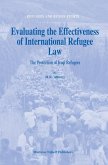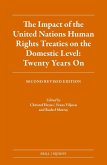Although human rights NGOs, and especially domestic human rights NGOs, have become crucial to the human rights movement over the years very little literature exists which describes their operations or sets out a framework in which they can be critically examined. This book sets out to begin to fill this gap by focusing on how NGOs mobilise the law and how their effectiveness could be measured. Focusing on case studies of actual domestic human rights NGOs, and using a comparative methodology, this book focuses its analysis on the real life problems of human rights NGOs. The result is a revealing snapshot of the legal work of human rights NGOs and a vision of how they could become even more important in the future.
Hinweis: Dieser Artikel kann nur an eine deutsche Lieferadresse ausgeliefert werden.
Hinweis: Dieser Artikel kann nur an eine deutsche Lieferadresse ausgeliefert werden.








